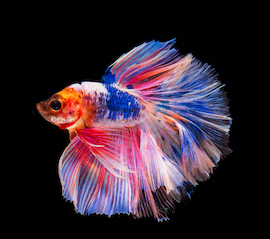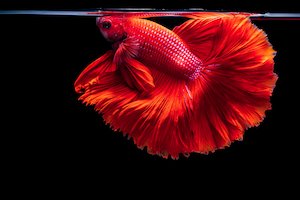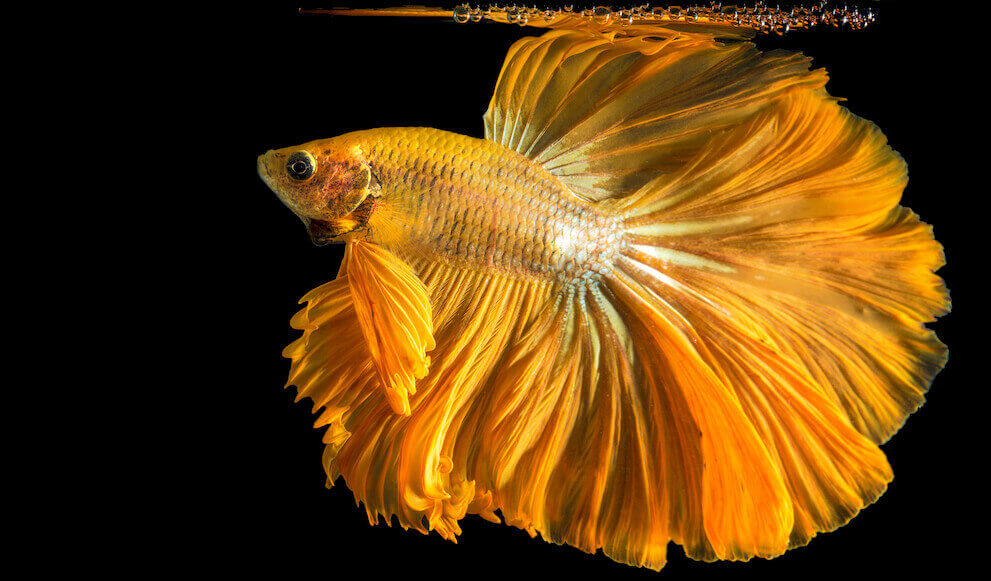
Betta
Scientific name: Betta splendens
Betta splendens, commonly known as the Siamese fighting fish, are renowned for their vibrant colors and elaborate fin displays. Native to Southeast Asia, these fish are labyrinth breathers, allowing them to survive in low-oxygen waters by gulping air from the surface.
IUCN Red List of Threatened Species : Vulnerable
Betta splendens, commonly known as the Siamese fighting fish, is a species celebrated for its dazzling array of colors and elaborate fin displays.
Originating from the shallow waters of Southeast Asia—particularly Thailand, Cambodia, and Vietnam—these fish inhabit rice paddies, slow-moving streams, and floodplains.
Their natural environment is often warm and low in oxygen, leading to the development of a unique labyrinth organ that allows them to breathe atmospheric air by gulping it from the water’s surface. This adaptation not only enables them to survive in challenging conditions but also makes them hardy inhabitants in home aquariums.

Navite Location
SouthEast Asia (Thailand, Cambodia, and Vietnam)
Varieties
Veil Tail / Crown Tail / Halfmoon / Double Tail / Plakat / Delta Tail
Suggested Tank Mates
Kuhli Loaches / Neon Tetras (with care) / Harlequin Rasboras / Snails / Some shimps
Tank Mates to Avoid
Other Male Bettas / Gouramis / Tiger Barbs / Cichlids / Goldfish
Diet
Betta Pellets / Bloodworms / Brine Shrimp / Daphnia
Breeding
Bubble Nest / Hatching 24-48 hrs / 3-4 days until swimming
Lifespan
2 to 5 years
Size
6 to 7.5 cm (2.5 to 3 in)
Minimum Tank Size
19 Liters (5 gallons)
Optimum Tank Temperature
24°C to 28°C (76°F to 82°F)
Ideal pH Level
6.5 to 7.5
Water Hardness
5 – 20 dGH
Common Health Issues
Ich (White Spot) / Fin Rot / Velvet Disease / Columnaris / Swim Bladder Disorder / Bloat or Constipation / Ammonia Poisoning
Suitable Products for Betta Fish
Filtration
Last update on 2025-07-05 / Affiliate links / Images from Amazon Product Advertising API
Interesting facts
Labyrinth Organ
Bettas have a special organ called a labyrinth organ, which allows them to breathe air from the surface. This unique adaptation helps them survive in low-oxygen environments, such as shallow rice paddies and stagnant ponds in the wild.
Bubble Nests
Male Bettas build bubble nests at the surface of the water to prepare for breeding. After the female lays eggs, the male collects them and places them in the bubble nest, where he guards them until they hatch.
Wide Range of Colors
Bettas are famous for their wide variety of colors, including red, blue, green, yellow, and even purple. They have been selectively bred for centuries to produce these vibrant hues, making them one of the most colorful freshwater fish.
Highly Intelligent
Bettas are surprisingly intelligent and can recognize their owners. They can even be trained to perform simple tricks, such as swimming through hoops, following your finger, or jumping for food.
Territorial Behavior
Male Bettas are highly territorial, especially toward other male Bettas. In the wild, they defend small territories and will flare their gills and fins to intimidate rivals. This is why they are often referred to as Siamese fighting fish.
Not Just Bettas
The term “Betta” refers to over 70 species of fish, not just Betta splendens (the Siamese fighting fish). Other species include Betta imbellis and Betta macrostoma, though Betta splendens is the most commonly kept in aquariums.



Betta FAQ’s
Can Betta fish live with ClownFish?
No, Bettas cannot live with Clownfish.
Bettas are freshwater fish, while Clownfish are saltwater species, meaning they require completely different water conditions to survive. Additionally, even if they lived in the same environment, Bettas can be territorial and aggressive, which could lead to conflict.
It’s best to keep Bettas with other compatible freshwater species.
Do Bettas Eat Shrimp?
Yes, Bettas can eat shrimp, but it depends on the type and size of the shrimp.
Small shrimp like cherry shrimp or baby shrimp may be seen as food by Betta fish and could be eaten. However, larger shrimp species, such as Amano shrimp, are less likely to be eaten and can coexist with Betta fish in the same tank.
It’s important to ensure that the shrimp have enough hiding places to avoid being harassed or eaten by a curious or aggressive Betta.
How do you mate Betta fish?
Set up a 5-10 gallon tank with warm water (78-82°F) and a bubble nest area. Condition the male and female with high-protein foods for 1-2 weeks, then introduce the female when the male builds a nest. The male will fertilize the eggs and place them in the nest. Remove the female after spawning. The male will care for the eggs until they hatch in 24-48 hours. Once the fry are free-swimming, remove the male.
How do you set up a Betta tank?
To set up a Betta tank, start with a tank that’s at least 5 gallons.
Keep the water temperature between 78-82°F using a heater, and use a gentle filter to maintain clean water without creating strong currents.
Treat the water with a conditioner to remove harmful chemicals, and add a substrate like gravel along with live or silk plants to provide hiding spots. Use soft lighting, as Bettas do not need strong lights. Before introducing your Betta, make sure the tank is properly cycled to establish beneficial bacteria.
Finally, add Betta-safe decorations like caves to give your fish places to explore and hide.
What Fish Can Live with Bettas?
Bettas can live with certain peaceful, non-aggressive fish that won’t nip at their fins or provoke them. Here are some good tank mates for Bettas:
- Corydoras Catfish: These peaceful bottom-dwellers stay out of the Betta’s way and help keep the tank clean.
- Harlequin Rasboras: Small, peaceful fish that are quick and usually won’t bother the Betta.
- Kuhli Loaches: Like Corydoras, these are bottom-dwellers that are unlikely to engage with the Betta.
- Mystery Snails or Nerite Snails: Not fish, but these snails can be great tank mates since they won’t provoke the Betta.
- Ember Tetras: Small, calm fish that usually don’t attract a Betta’s attention.
- Ghost Shrimp or Amano Shrimp: Larger shrimp like Amano shrimp can often coexist with Bettas, though smaller shrimp may be eaten.
It’s important to monitor interactions and ensure your Betta doesn’t show aggression toward its tank mates.
Why do Bettas fight?
Betta fish, especially males, are known to fight due to their territorial and aggressive nature. Here are the main reasons why Betta fish fight:
- Territorial Instincts: In the wild, Betta fish establish territories, and males are especially protective of their space. When another Betta, particularly a male, enters their territory, they see it as a threat and respond aggressively to defend it.
- Competition for Resources: Betta fish may fight over food, space, or potential mates. In a confined environment like an aquarium, they might feel threatened by the presence of another Betta, leading to conflict.
- Mating Behavior: During the breeding process, male Bettas can become aggressive to both other males and females, especially when protecting a nest of eggs.
- Instinctive Aggression: Bettas have been bred for their vivid colors and aggressive nature for centuries, particularly in the case of “fighting fish.” This has heightened their natural instinct to fight when encountering other Bettas.
- Stress and Environmental Factors: In some cases, Betta fish may become more aggressive due to stress, poor water quality, or lack of space in their tank. This stress can lead them to fight more readily.



